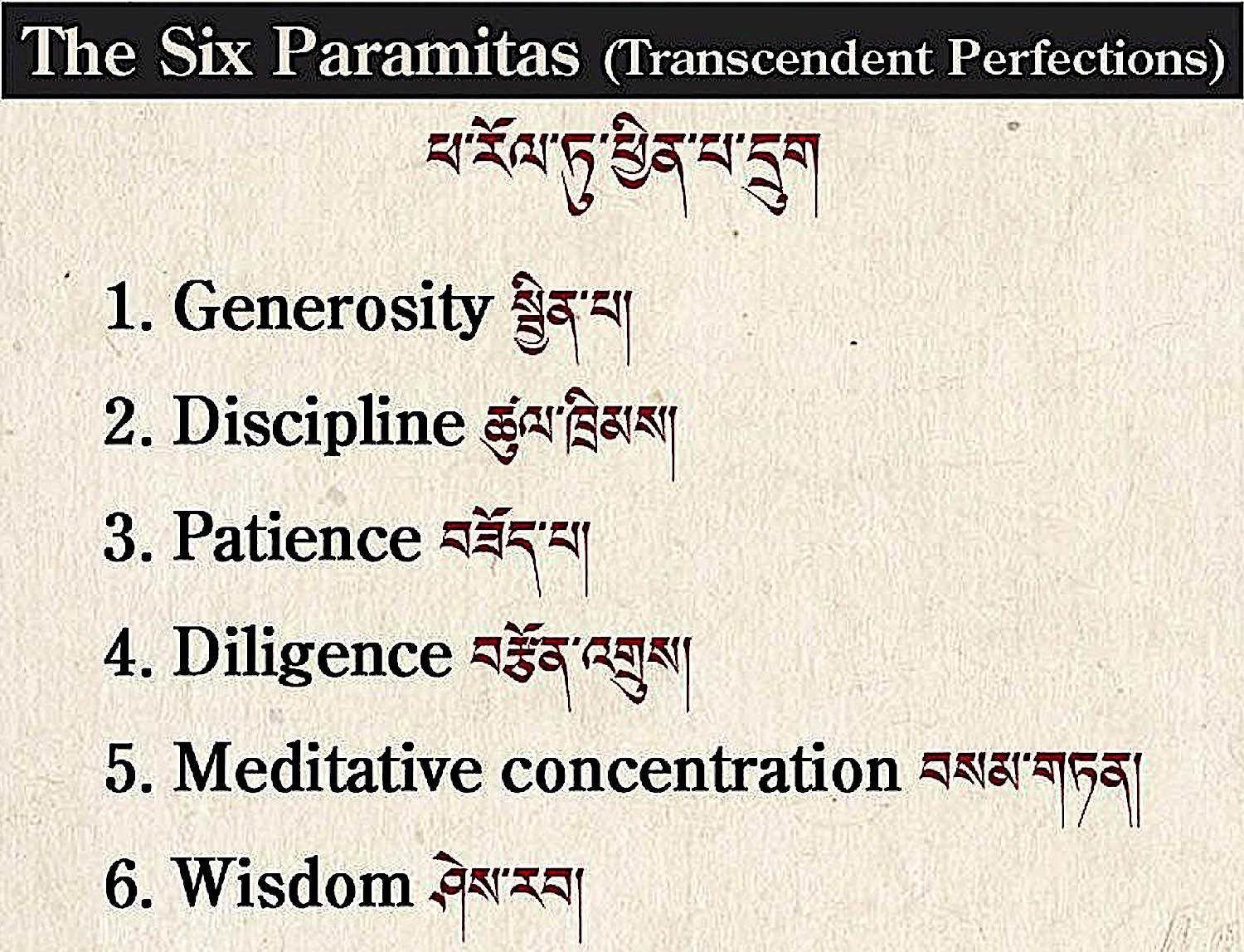Top 7 Buddhist Ideas for You to Develop Inner Transcendent Peace: Buddha Nature, Six Paramitas, Mindfulness and More
In our modern world, inner peace is elusive. Here are seven ideas inspired by Buddhist practices and teachings that can help you find inner peace, de-stress, and potentially transform your life.
Shakyamuni Buddha taught more than 2500 years ago, that the secret to our inner peace — and ultimately our realizations on the path to Enlightenment — depend on the transcendent perfections: the Six Perfections. [See Six Perfections below.] These are:
- Generosity
- Discipline
- Patience
- Diligence
- Meditative Concentration
- Wisdom.
How do these apply, though, to modern, stressful lives? In this feature, I explore seven Buddhist ideas to help you develop your inner transcendent peace, even in our hectic samsaric lives.
By John Peterson
[Bio bottom]

1. You are a perfect whole
Many people feel hollow inside their hearts. Buddha taught that everyone has Buddha Nature — everything they need inside of them to find inner peace and, ultimately, spiritual realizations. Buddha showed us how valuable our precious human birth is, how fortunate we are to be born with this Buddha potential. It is up to us to recognize our potential and actualize our perfect whole. It can be helpful to remain mindful of our Buddha Nature:
“Every sentient being—even insects—have Buddha nature. The seed of Buddha means consciousness, the cognitive power—the seed of enlightenment. That’s from Buddha’s viewpoint. All these destructive things can be removed from the mind, so therefore there’s no reason to believe some sentient beings cannot become Buddha. So every sentient being has that seed.”
— HH, the Dalai Lama [1]
- For a full feature on Buddha Nature, and why it is one of the most important teachings in Mahayana Buddhism, see>>

2. Understand fear to shed it
One of the major reasons why people have difficulty developing inner peace and contentment is fear — triggered by our awareness of the impermanence of ourselves and the world around us. We fear losing our lives, our status, our loved ones, our achievements, and important possessions. Buddha taught many methods to help us manage our fears, for example in the Abahaya Sutta. [Full feature on Abahaya sutta here>>]
The first teaching from the Buddha, after he attained Enlightenment, stressed our fears of separation and our attachments:
“What, monks, is the truth of suffering? Birth is suffering, decay, sickness and death are suffering. To be separated from what you like is suffering. To want something and not get it is suffering. In short, the human personality, liable as it is to clinging and attachment brings suffering.” — Buddha’s First Teaching on the Eight Noble Truths
Anything that can lead to loss — be it divorce, war, or death — is a major stress-point for the majority of people across the world. More than 2500 years ago, Buddha taught us how to overcome our attachments, with his teaching on the Eightfold Path.
At a more mundane level, you can overcome the fear of failure and other fears by understanding where they came from and why they live within us. This was taught by the Buddha in the Mindfulness sutra>>
You can do this by developing both analytical and mindful meditation skills. Introspection involves looking inside ourselves. By discovering yourself, you’ll finally heal and reduce your fears and increase your inner peace.
- For a feature on the Eight Rights, the Noble Eightfold Path of Buddha, see>>
- For a full feature on developing mindfulness, see>>

3. Feeling connected through mindfulness to all beings can help fight loneliness
Loneliness is a huge problem affecting millions of people around the world. Regardless of the type of loneliness that you are experiencing – solitary lifestyle, lack of a companion, or losing a loved one – Buddhism allows us to understand we are connected to all beings, helping us remain receptive to the world with or without other peoples’ presence.
By living mindfully, you’ll start feeling connected to millions of living things from the clouds in the sky to the ants in the ground. You need to evaluate how you perceive loneliness to deal with it effectively. When you connect with all living creatures, you’ll naturally purify and heal your soul. [For a complete section of features on Mindfulness methods in Buddha Weekly, see>>]
“Even though we may fear being lonely, it doesn’t mean we can’t still enjoy being by ourselves or being quiet. Enjoying solitude can be wonderful, although often it doesn’t take long for the urge for activity or entertainment to arise. We can watch this urge when it arises and choose to follow it, or we can notice it and return to and remain in solitude.” author Ezra Bayda [2]

4. Compassion and understanding will ease your anger
Anger is a base and primal emotion that most people experience every day. However, you can’t control everything in your world or stop yourself from getting into situations that trigger anger. However, you can control how you perceive your world and respond to different situations. In Buddhism, notably in Mahayana Buddhism, compassion (“metta” in Sanskrit) is the “remedy” for the “poison” of anger. For this reason, “Metta” or Compassion meditation is the core practice recommended for “anger.” [In fact, in scientific studies, Metta Meditation can slow aging among nine other benefits>>]
One of the core teachings of Buddha is how to deal with negative emotions, from anger, hate, and jealousy. They are termed the “three poisons”: anger, hate and jealousy — represented, symbolically by the pig, the snake and the bird in Tibetan thangkas. An expanded list of these negative emotions, the five poisons, relate directly to the symbolism of Mahayana Buddhism’s Five Buddhas. Notably, the Compassionate Buddha Amitabha’s practice is designed to overcome the poison of anger. [For a feature on the Five Buddhas and Five Poisons, see>>]
When you start feeling negative emotions, you need to step away from the situation skillfully. Buddha taught these skillful means in many sutras (suttas). The key overriding theme of these teachings is to skillfully overcome the notion of an “abiding self.” It is our ego that drives our clinging to the three poisons. Our “ego” is afraid of loss. Our “ego” desires recognition. Understanding the impermanence of ego, an abiding self, can help us calmly contemplate the poisons.
- For a sutra focused on this concept, see the Nadi Sutta>>
- For a feature video teaching on Compassion (Metta) see>>
- For a feature on Compassion Metta Meditation practice, see>>

5. Meditate to catch the monkey mind
Most people today are anxious or stressed out. A recent study found that 30 percent of Americans believe that anxiety and stress destroy their physical and mental health. However, stress is not caused by our modernized systems. It has always been there since time immemorial. Buddha taught methods for taming the “monkey mind” close to 2500 years ago.
Buddha meant that the mind behaves like a monkey – jumping and running around everywhere without a break. Only by practicing mindfulness can you catch the monkey mind. When your mind is calm, your stress and anxiety will naturally melt away.
Some features focused on mindfulness meditation:
- Why it can be a struggle to practice meditation regularly — and tips for overcoming the obstacles
- A Simple Step-by-step Mindfulness Meditation Guide
- Mindfulness and meditation daily: tips for making it a healthy habit
- Dealing with the Monkey King: Meditation Techniques for People With Unsettled Monkey Minds

6. Prajna: your inner dialogue is not you and the impermanence of ego
The driving force behind all our obstacles to inner peace are egos — our perception of what we are. It is this perception of self that clings to concepts such as anger and jealousy. Aside from mindfulness practices, analytical meditation is the go-to practice for helping us understand our true natures and overcome our ego.
In the Nadi Sutta, Buddha taught:
“He assumes feeling to be the self, or the self as possessing feeling, or feeling as in the self, or the self as in feeling. That feeling tears away from him, and so from that cause he would come to disaster…”
Buddha’s teachings encourage us to observe the difference between our true nature — which is impermanent — and the inner dialogue which we believe to be the self. Since the inner dialogue is not you, analysis can help us reduce the stress associated with our ego.
This analysis and meditation can help us develop Prajna — wisdom. The twin core teachings of the Buddha were Compassion (Metta) and Prajna (Wisdom.)

Among the greatest of Mahayana Sutras, the Prajnaparamita, is considered the loftiest of teachings, although it can take a lifetime to grasp. Although the longer Prajnaparamita is 80,000 lines, the shortest form, the Heart Sutra, can be reduced to the profound words:
“Form is Emptiness; Emptiness if Form.”
Emptiness here is not a nihilistic concept, but refers to Interdependent Arising and the illusory nature of Ego.
- For a feature on Emptiness, see>>
- For a feature on Prajnaparamita, see>>
- For a feature on Heart Sutra see>>
- For a feature on Interdependent Arising, see>>

7. Practicing the Six Paramitas: the Six Liberating Actions
One of the core practical teachings of Buddha is on how to develop the Six Paramitas.
These six Paramitas (Sanskrit in brackets)are:
(1) generosity (dāna): for a feature on Generosity, see>>
(2) morality (śīla) — for a feature on Morality, see the Eightfold Path>>
(3) patience (kṣānti) — for a feature focused on Shantideva’s “Patience and Bodhicitta” see>>
(4) diligence or vigor (vīrya) — for inspiration on diligence, see classic biographies such as Milarepa’s life>>
(5) concentration (meditation) (dhyāna) —
(6) wisdom (prajñā) — i.e. Prajnaparamita, as in the sutra or the Wisdom Mother>>
You can probably see how these “perfections” can fit into your daily lives. All six are as relevant today, as they were in the days of Shakyamuni Buddha.

Conclusion
Buddha’s teachings remain an inexhaustible source of practical wisdom today — as useful and timeless as they were 2500 years ago. He left behind valuable and practical lessons that anyone can use to live a productive and successful life.
NOTES
[1] The Dalai Lama: “On Buddha Nature” >>
[2] From Aging for Beginners by Ezra Bayda © 2018
More articles by this author
Search
Latest Features
Please support the "Spread the Dharma" mission as one of our heroic Dharma Supporting Members, or with a one-time donation.
Please Help Support the “Spread the Dharma” Mission!

Be a part of the noble mission as a supporting member or a patron, or a volunteer contributor of content.
The power of Dharma to help sentient beings, in part, lies in ensuring access to Buddha’s precious Dharma — the mission of Buddha Weekly. We can’t do it without you!
A non-profit association since 2007, Buddha Weekly published many feature articles, videos, and, podcasts. Please consider supporting the mission to preserve and “Spread the Dharma." Your support as either a patron or a supporting member helps defray the high costs of producing quality Dharma content. Thank you! Learn more here, or become one of our super karma heroes on Patreon.
John Peterson
Author | Buddha Weekly
John Peterson is a journalist with 4 years’ experience working as an essay writer at best essay writing service He is a professional mini-tennis player and he has written a novel “His heart”. You can find him at Facebook.















